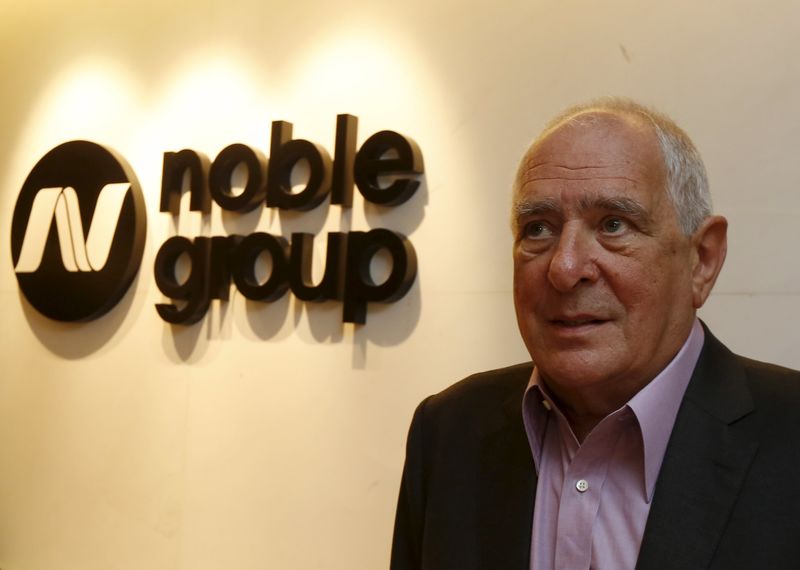By Anshuman Daga and Denny Thomas
HONG KONG (Reuters) - Noble Group, Asia's biggest commodities trader, expects to ride out the market downturn and recover from recent accounting-related allegations by being nimbler and asset-light, its founder and chairman Richard Elman told Reuters in an interview on Friday.
Noble was thrust into the spotlight a year ago when Iceberg Research published the first of three detailed reports on the company, alleging it inflated its assets by billions of dollars by inaccurately representing the value of its contracts.
Elman, 75, said he sees no further disruptions to the business from those claims, which Noble rejects. A board-appointed consultant, PricewaterhouseCoopers, found Noble had complied with international rules.
"Last year, we had to separate our business from rumor and gossip. We got attacked in a very low regulated environment," Elman said in his first media interview in three years. "We feel it's behind us. There is no reason for us to have any further disruption in that sense."
Elman is preparing Noble, a Hong Kong-based group he set up with $100,000 in 1986, for a new era as commodity prices are mired in their deepest slump in recent years.
"We need to go back to being modest and cautious and economical," he told Reuters at his 18th floor office overlooking Hong Kong's Victoria Harbour.
Elman, Noble's largest shareholder with more than a 22 percent stake, said he believed the commodities cycle was "bottoming".
"I wouldn't rule out oil going down to $20-$25 a barrel, but I think it's not going to go down to $10," he said, adding oil prices were unlikely to stay at depressed levels for long.
NEW BLOOD
Plans to bring in new investors to Singapore-listed Noble were taking time, Elman said.
"Most sectors are pretty bashed up at the moment, so new money is going to be very selective. People want to investigate the company and they want to understand the people, they want to learn about the business and ... it does take time."
The day-to-day running of Noble has been handed over to CEO Yusuf Alireza, a former Goldman Sachs (N:GS) banker, and Elman said: "I think he's faring well. He works extremely hard, the guy hardly ever sleeps."
Elman, who saw Noble grow to be one of the world's biggest commodity suppliers - from coal and iron ore to coffee - and watched revenue jump by nearly 10 times to $86 billion over the past decade, said the business model of commodity merchants was rapidly changing.
"Do I think merchants have a future?, yes absolutely," he said.
The commodity market slump and the accounting issues have wiped out about three-quarters of Noble's market value over the past year, to just $1.4 billion, and prompted Standard & Poor's and Moody's to cut its credit rating to junk. Noble is not alone in being punished by the stock market; shares in bigger rival Glencore (L:GLEN) have dropped by more than two thirds in the past year.
Elman, an art collector with an eye for pottery and artifacts - more than three dozen paintings from his personal collection hang on the walls of Noble's headquarters, including a 1995 Yang Din abstract behind his desk - acknowledges it has been his most challenging year.
"Sometimes probably my mind was a little foggy on what to do and how to do it, but I never didn't believe we wouldn't succeed in the end," he said.
Elman said he still has the support of Noble investors, who include the powerful China Investment Corp.
Noble, which has a total of $2.5 billion worth of loans due this year according to Thomson Reuters LPC data, will hold an extraordinary shareholders' meeting in Singapore next week.

"We have had a lot of constructive dialogue with many of our shareholders. And if this had been a Noble issue and not a sectoral issue, it's one thing. But it wasn't. Everybody has been affected by it," he said, referring to the market downturn.